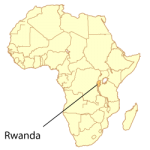Rwanda
Highlights
- Game parks such as Parc National des Volcans, Akagera and Nyungwe Forest
- Gorilla tracking and the Diane Fossey Gorilla Fund Research Centre
- Cultural experiences
- Can be added on to Kenya/Tanzania itineraries

A tiny, landlocked republic in Equatorial Africa, Rwanda lies on the eastern rim of the Albertine Rift and the watershed between Africa’s two largest river systems: the Nile and the Congo. Often called the “land of a thousand hills”, Rwanda is a mountainous country with a moist, temperate year-round climate.
Rwanda has a number of unique delights to offer travelers. Parc National des Volcans in the Virunga volcanoes is home to the Mountain Gorillas to which Dian Fossey dedicated her life. Nyungwe Forest, one of the largest montane forests in Central Africa, is renowned for its large troops of colobus monkeys and rich variety of orchids. Akagera National Park is a savannah park with elephants, hippo and crocodile. Lake Kivu is a beautiful inland sea enclosed by steep terraced hillsides. There are a large variety of birds. Rwanda has a rich culture with its second city, Butare, having one of the finest cultural museums in Africa.
Rwanda is the most densely populated country in Africa. French, English and Kinyarwanda are the most widely spoken languages and the population of about 10 million people is largely Christian with some Muslim and Animist communities.
Originally the domain of hunter-gatherers, Rwanda emerged into a centralized state with a feudal monarchy in the fifteenth century. It became a German colony in 1890 and was mandated to the Belgians after the First World War. In 1962, under Prime Minister Gregoire Kayibanda, Rwanda gained independence. Ten years later Major General Juvenal Habyarimana came to power. His death in a plane crash in April 1994 unleashed the genocide in which about one million Rwandans are thought to have been killed and nearly twice as many fled into exile. In recent years, as peace and stability have returned under President Kagame, many Rwandans have come back. Local elections were held for the first time in 35 years in 2001 and are an encouraging sign of the steady return of stability to the country.






